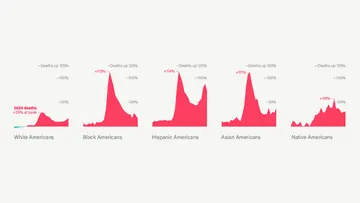Spencer Woods wanted to fight a crime that didn’t exist.
As a sheriff’s investigator in Monroe County, Mississippi, near the Alabama border, he would occasionally receive reports from his state’s child protection agency that a baby had tested positive for illegal drugs at birth.
To Woods, the mothers had endangered their fetuses and should face criminal charges. But unlike some other southern states, Mississippi law doesn’t define a fetus as a person; in fact, voters had rejected a ballot measure to do just that more than a decade ago.
So when Woods would receive these referrals, he had to effectively place them in the trash.
“We were coming across those type [of] things that I considered to be child abuse, but as far as the statute, the state wasn’t recognizing that as actual child abuse,” Woods said in an interview.
That’s until 2019, when Woods decided that his office would take matters into its own hands and pursue child endangerment cases against the women anyway. He argued that child abuse can, in fact, take place inside the womb, challenging anyone to prove otherwise.
Through news reports and court records, Mississippi Today identified 44 cases in which law enforcement officers in Mississippi have arrested women for a crime that, based on existing state law, they may not have actually committed.
“The state of Mississippi does not look at a child as being a child until it draws its first breath,” Woods said. “Well, when that child tests positive when it's born, the abuse has already happened, and it didn’t happen to a ‘child.’ So it was a crack in the system, the way I looked at it. And that’s where we’re kind of playing.”
While medical experts warn against drug use during pregnancy, they point out that not all babies exposed to drugs in the womb are born with medical problems. But Woods said that he doesn’t need evidence of harm to the fetus — just a positive drug test — to pursue a child endangerment case.
Monroe County has accounted for 12 of the 44 cases we found. Woods said he was unaware that 200 miles to the south of his jurisdiction, officials in Jones County had already been filing similar charges against mothers for years, Mississippi Today reported in 2019. All but three of the cases Mississippi Today identified from 2015 to 2023 came from Monroe and Jones, two small rural counties.
While Monroe County has offered leniency in keeping these women out of prison, Jones County’s lone judge, Circuit Court Judge Dal Williamson, has given at least six women long prison sentences for using drugs while pregnant. The difference in sentencing stems in part from the counties charging women under different sections of the child abuse law. Monroe County has utilized the child endangerment section that bars parents from allowing their children to be present around drugs, such as in meth labs. Meanwhile, Jones County has charged women in similar circumstances with poisoning their fetuses. Williamson ordered the women to serve between two and 15 years in prison.
“I don’t understand how in the world a mother expecting a child would continue to pour this poison in their body,” Williamson said at a sentencing last year, according to the local newspaper Laurel Leader-Call. “Your baby can’t say, ‘No, mama, stop.’”
Some local investigators and prosecutors are pursuing similar cases in Alabama, Oklahoma and South Carolina. They are policing pregnant people under an expanded interpretation of child abuse and neglect laws — even if parents birthed healthy babies, according to an investigation by The Marshall Project, Mississippi Today, AL.com, The Frontier and The Post & Courier.
Officials in Etowah County, Alabama, 185 miles to the east of Woods, are perhaps the champions of this approach, having arrested hundreds of women in the past several years.
Woods’ strategy has never been tested in court, because each of the 12 women his office has arrested have pleaded guilty under diversion or probation deals that keep them out of prison.
Defense lawyers said they would like to take a case to trial, but their clients are reluctant. “They’re not wanting to take that risk of going to trial and getting convicted because they’re all fighting to get their kids back,” said Luanne Thompson, one of two public defenders in Monroe County who has handled these cases. “That is the dilemma that they’re in.”
Most of Thompson’s clients have received “non-adjudicated” sentences, meaning they avoid prison and their records will be cleared if they satisfy the terms of their probation.
Public health experts fear that the threat of prosecution could dissuade pregnant people from seeking prenatal care at a time when the state is facing growing threats to the health of newborns. Mississippi has the highest infant mortality rate in the nation, at roughly 9 deaths per 1,000 live births.
Cases of infant hospitalizations in Mississippi related to drug exposure in the womb have skyrocketed from more than 300 cases in 2015, when Jones County began prosecuting these cases, to four times that in 2021, at a high of more than 1,200.
State Health Officer Daniel Edney has vowed to address these issues. His department compiled a recent report that identified the uptick in drug-exposed newborns. The report blamed the increase on changes in diagnostic coding at hospitals, as well as rising substance abuse due to the isolation and reduced access to therapy people experienced during the coronavirus pandemic.
But Edney, a longtime addiction specialist, was shocked to learn from recent reporting by The Marshall Project and Mississippi Today about local prosecutions of mothers not unlike his own patients.
“I thought, ‘This is archaic,’” Edney said. “There are a lot of medical conditions that if a pregnant mom doesn’t take care of herself, it hurts the baby. This is the one disease that we’ll incarcerate a woman for.”
He warns that prosecuting moms with substance use disorders as child abusers will only deter them from seeking care, making it harder for the medical community to do its job.
“We don’t need law enforcement going in to arrest women who are trying to get help,” Edney said. “It has a chilling effect on the women out there who are trying to decide what they need to do.”
Though Mississippi officials enacted and defended the state abortion prohibition that ultimately led to the U.S. Supreme Court overturning Roe v. Wade last year, the state does not recognize “fetal personhood.” In 2011, Mississippi voters rejected an amendment to the state constitution proposed by anti-abortion activists that would have defined a fertilized egg as a person.
The Mississippi Supreme Court has twice taken up the issue — through two cases in which local officers charged women with murder or manslaughter after losing their pregnancies in 2006 and 2009. Both times, justices wrote ambiguous opinions, and the lower courts ultimately threw charges out in both cases.
Mississippi’s abortion prohibition doesn’t criminalize pregnant people, nor does it treat abortion as murder. The law stipulates prison terms only for the person who performed the abortion, not the woman who sought it. Bills filed in the Mississippi Legislature to criminalize drug use while pregnant under the state’s child abuse statute have died with little attention. Despite those failed efforts, the sheriff’s investigator in Monroe County decided his department needed to act.
“We’re eventually gonna have to deal with possibly the Supreme Court or possibly the state Legislature on changing the law, hopefully,” Woods said.
He said he realizes that his tactic may have implications for reproductive rights.
“I always had to keep that in the back of my mind, the Roe v. Wade type stuff, what women can do with their bodies,” Woods said. “That was never my argument. My argument was always what was best for the child. I discussed it with my assistant district attorney, who is a woman, and she had my back on this, and we went forward with it.”
But a growing body of research shows that what’s best for the health of newborns is critical bonding with their mother.
“We have to balance the health and safety of that baby while also trying to make sure that family stays connected,” said Dr. Anita Henderson, a Hattiesburg pediatrician and president of the Mississippi chapter of the American Academy of Pediatrics. “If you’re trying to reunify families or make that mom or that family as healthy as possible, then the goal should be treatment. ... Incarceration and the threat of incarceration have proven to be ineffective.”
Christina Dent, who has cared for children in Mississippi’s foster care system as a result of their mothers’ drug addictions, supports the concept of fetal personhood and is personally against abortion. She’s also the founder of End It For Good, a nonprofit that advocates for the legalization of drugs. Dent’s group argues that criminalizing drugs only increases harm to people and society. She said that treating these mothers as criminals is “opposed to a pro-life ethic” and leads to worse outcomes for both the mother and baby.
“I would say, yes, that [fetus] is a child,” Dent said, speaking for herself and not on behalf of her organization. “And because of that, shouldn’t we do everything possible to protect that child from further harm, help the mother access prenatal care, and protect the bond of this little family?”
Monroe County Sheriff Kevin Crook has earned a reputation for taking a compassionate approach to drug offenses, placing an emphasis on treatment and rehabilitation. In Crook’s view, though, the threat of prison motivates people to take recovery seriously.
“We gotta have something for these people to run into,” Crook said, “or they’re not just gonna stop on their own.”
Woods agreed. “I’m not really trying to put these women in prison,” he said. “What I’m trying to do is correct the issue. We do offer counseling and rehab and those types of things.”
But the investigator acknowledged there’s never enough mental health services to cover the need. He also couldn’t say how effective his strategy is; he doesn’t have any data to show how many mothers he’s arrested have gotten clean or reunited with their children.
Woods said he also believes that smoking or drinking alcohol while pregnant — which can produce similar if not more harmful effects as controlled substances on a fetus’ development — constitutes child abuse.
He’s aware his approach could be applied to other activities that might endanger a fetus. “Of course, you keep going, ‘You’re eating too much sugar. You’re ingesting too much caffeine.’ Where do you stop with it?” Woods said.
He draws the line at illegal substances. “I have to go by statutes,” he said. “I can’t just decide what I want to.”

